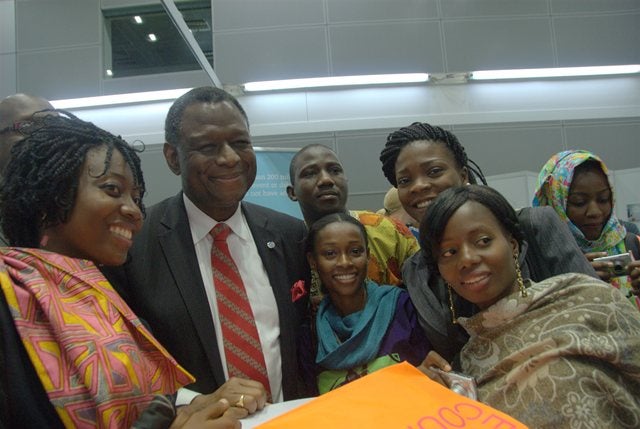REPRESENTING 149 countries and 2200 organisations, 4500 participants and 411 (mainstream) journalists converged in Malaysia last week to regroup and strengthen individual and political commitments to the realisation of women and girls' sexual and reproductive health and rights.
Paying in advance

Held in Kuala Lumpur, the conference was rich with positive vibes that renewed participants' determination to accelerate activities related to this issue, a core mandate of the United Nations Population Fund.
The wide range of stakeholders included young people, sex workers, people living with HIV/AIDS, advocates for the elimination of abstract poverty, non-government organisations, philanthropists and the private sector.
Malaysia's Prime Minister Datuk Seri Najib Razak opened the conference with the expressed declaration that (universal) access to sexual and reproductive health (SRH) was a basic human right, discussing Malaysia's remarkable achievement of reducing maternal mortality to a historic low of 29 per every 1000, in 2011.
"Our national, regional and global stability depends on it," he said.
"We know that investing in girls and women - in their education, health safety, rights and financial independence, pays. When girls and women are educated, healthy and independent, the benefits extend beyond individual freedom to prosperity and achievement."
At the end of the conference, government ministers affirmed they would hold themselves accountable for achieving universal access to family planning, and would work to eliminate barriers to service delivery and commodities, particularly for young people.
Also encapsulated in the Call to Action on Meeting our Commitments for Family Planning was the ministers' promise to ensure health financing systems eliminated financial barriers to services or access to a wide range of contraceptives.
It may be prudent to define for you what the United Nations Population Fund (UNFPA) means by reproductive health. It is "a state of complete physical, mental and social wellbeing and not merely the absence of disease or infirmity, in all matters relative to the reproductive systems and to its functions and processes. Reproductive health therefore implies that people are able to have a satisfying and safe sex life and that they have the capability to reproduce and the freedom to decide if, when and how often to do so".
UNFPA then works with governments and non-state actors towards ensuring that people receive correct and timely SRH-related information; access to good quality health facilities and services; that women have access to safe, effective, affordable and acceptable methods of family planning; etc.
Maternal mortality is the death of pregnant women, sometimes in the process of giving birth or shortly after; globally, a woman dies every two minutes from pregnancy-related complications and 90 per cent of maternal deaths occur in developing countries.
One of the messages that came out of the conference clearly was how universal access to SRH was not merely a health issue. Universal access to quality reproductive health information, facilities and services is a political issue, it is about dignity of all individuals.
When a nation achieves universal access to SRH, individuals can live in dignity because it ensures our wellbeing and thus our effective participation in social, political and economic processes - and that, UNFPA Deputy Executive Director Kate Gilmore says, makes it (SRH) everyone's business.
"It does matter for us to know that the burden of maternal mortality falls on the shoulders of those under 15 in an unfair and unjust way," Gilmore said at Women Deliver. "One in nine girls is married before she turns 15 and more girls between 15 and 19 die from pregnancy than any other cause. We've got to know this stuff and we've got to change that world for young people."
In terms of contraceptives, 600 million women globally use modern contraceptives while 220 million who need it still cannot access contraceptives, for varying reasons.
The conference heard of the Senegal experience which uses the push model- that is actively taking contraceptives to the health centres to ensure contraceptives are in stock, at all times. For a country where 90 per cent of the population is Muslim, Senegal's health minister Awa Marie Coll-Seck said key to their success was the involvement of faith leaders from the outset.
Philanthropist and businesswoman Melinda Gates stressed the need to place women and girls in the centre of any development plan. "The reason we do this work is concrete and simple - women tell us that having access to contraceptives will help them build a good life for themselves and their families. With access to contraceptives, children are healthier, there are more options, families become wealthier and keep children in schools," she said.
Ms Gates spoke of how young people were leading most initiatives on the African continent, talking about contraceptives and access points, through street drama, in areas where teenagers gather after school.
UNFPA executive director Dr Babatunde Osotimehin spoke of the importance of countries strengthening systems, whether financial or the supply chain of commodities. "Family planning is an essential human right, but it is also a key that unlocks untold rewards for both individuals and nations. That is why it remains at the heart of UNFPA's work," Dr Osotimehin said.
"At the 1994 International Conference on Population and Development in Cairo, the world agreed that population is not just about counting people but about making sure that every person counts. That includes women, girls and young people."
"More than 40 per cent of the world's population are under 25 - three billion young people, three billion opportunities. Let us make sure that we look after them."
In essence, investing in family planning today equates to paying an advance for the well-being of women, girls and young people in future.
The issue of ensuring universal access to sexual and reproductive health is everyone's business; let's make significant, appropriately-designed and relevant investments today.
- This is part of a series of columns provided for publication to Fiji's largest national daily newspaper, The Fiji Times, fortnightly.


